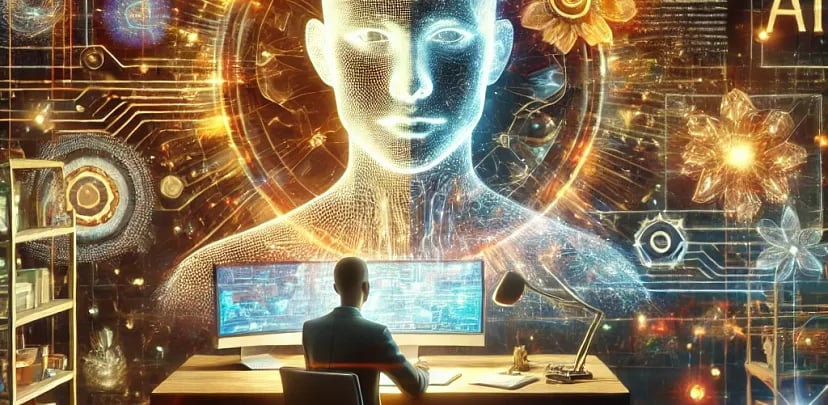Soy el Psicólogo de Mi Programa de IA
La inteligencia artificial está revolucionando la forma en que interactuamos con la tecnología. Ya no se trata solo de líneas de código y algoritmos; hoy en día, los sistemas que creamos pueden aprender, adaptarse y, de alguna manera, "pensar". Sin embargo, detrás de esta aparente autonomía se encuentra un rol fundamental que pocos consideran: el programador como psicólogo. Sí, el psicólogo de su propia creación.
INTELIGENCIA ARTIFICIAL
Fabricio De los Santos @podcastfabricio
1/15/20252 min read
Artificial intelligence is revolutionizing the way we interact with technology. It’s no longer just about lines of code and algorithms; today, the systems we create can learn, adapt, and, in a way, “think.” However, behind this apparent autonomy lies a fundamental role that few consider: the programmer as a psychologist. Yes, the psychologist of their own creation.
Creating an AI program is not just a technical task. It involves understanding how it “thinks,” how it reacts, and how it will impact those who use it. In this post, we’ll explore the fascinating role of developers as the psychologists of their AI programs.
More Than Code, a Personality
AI programs, especially those designed to interact with humans, are not neutral entities. They are loaded with decisions: how they respond, the tone they use, and the values they reflect. As programmers, we are responsible for giving them a “personality,” which directly impacts the user experience.
For example:
How should your AI respond to an error? With humor, empathy, or formality?
What moral values does it reflect when making automated decisions?
Is it approachable and understanding, or direct and logical?
In many ways, we shape the psychology of the program. We decide how it will “perceive” the world and how it will respond to it.
The Role of the Programmer as a Psychologist
When working with AI, you’re not just a technician; you’re a behavior architect. Here are some psychological aspects you need to consider:
Digital Empathy
An effective AI must understand and respond to human emotions. Designing this capability involves developing systems that detect emotional patterns and respond appropriately. This isn’t just technical; it’s deeply psychological.Conflict Management
Imagine a user arguing with your AI. How should it respond? Should it apologize, redirect the conversation, or stand its ground? These decisions are as psychological as they are technical.Unconscious Bias
When training your program, you might unintentionally transfer biases. Being aware of these biases and correcting them requires constant self-evaluation, much like analyzing your own prejudices when interacting with others.The Voice of AI
The choice of tone, style, and rhythm in an AI’s responses can make the difference between a successful or frustrating interaction. This is akin to training someone in social skills.
The Challenge of Self-Evaluation
As psychologists of our programs, we also face the challenge of constantly evaluating ourselves. Are we designing an AI that truly solves problems, or one that merely reflects our own limitations and biases? This requires humility and a willingness to learn, both from the technology and its users.
A Future Exercise
Imagine a near future where AI developers are trained in psychology as part of their education. They would learn to better understand human needs and how to reflect them in their creations. In many ways, creating AI would become not just a technical job but a deeply humanistic one.
What are we creating?
Being the psychologist of your AI program is a fascinating challenge. It involves going beyond code to delve into the complexities of human behavior and how it can be reflected in machines. At the end of the day, the AI we create is not just a tool; it’s a reflection of ourselves and how we understand the world.
So, what kind of psychologist are you for your programs? Are you creating systems that understand and empathize, or just cold problem-solvers?


EL MOMENTO PERFECTO Y EL SENTIDO DE LA ADVERSIDAD
FABRICIO DE LOS SANTOS
Creo en una tecnología al servicio del ser humano.
Ayudo a emprendedores y equipos a crear soluciones digitales con sentido, usando herramientas como IA, low-code GeneXus y reflexiones que potencien no solo sus negocios, sino también su forma de ver el mundo.
soporte@fabriciodelossantos.com
© 2026. Todos los derechos reservados